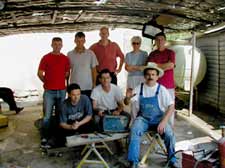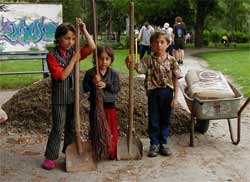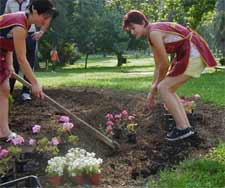








|
Who
We Are Center
for Balkan |
The New Initiative
Takes Off CBD
receives World Bank funding to implement The New Initiative in Tuzla
beginning in September 2002. By Christopher Bragdon
Living on charity is a humiliating and debilitating experience. Unfortunately, it is an experience that many Bosnians know too well. A very common refrain one hears from Bosnians is that they do not want to live on charity. They want jobs. They want to earn a living. Bosnians deeply appreciate the good will of Americans who have devoted their own funds to help them. Yet their need for help in recovering from a horrible genocidal war is accompanied by a profound need for a sense of accomplishment, for self-respect, for dignity. Often humanitarian aid has had the unintended effect of ruining the optimism and sense of self-reliance so needed in Bosnia. And, mirroring the Bosnians' concerns, donors would like to know that their good will is being used to help people become self-reliant, not become stuck in an endless cycle of dependency. In response to this need for an innovative and truly empowering way of delivering aid, the Center for Balkan Development has developed a model for revitalizing communities that is fueled by goodwill funds but has none of the common pitfalls of humanitarian aid. This model for community-business empowerment, called "The New Initiative" embodies no outright charity, no sense of entitlement, and no dependency. Our pilot project involved bringing together the business, government, and community organizations of Tuzla to restore the city╠s central park, with each organization making a significant contribution. Anatomy of a Project
Despite its ultimate great success, our pilot project got off to a very precarious start. In late June 2001, Tuzla was inundated with the worst floods in decades. All major roads into Tuzla were cut off, and homes in surrounding villages were being swept away. The situation was so bad that for some it brought back the disturbing feeling that Tuzla was once again surrounded by a hostile force. Consequently, our project, which required significant contributions from the local government and the business community, was not a top priority. And although Tuzla Mayor Imamovic had promised in April to provide us with what we needed for our July project, because of the floods there was some question as to whether we could even have a meeting with him. With our window of opportunity closing and our time for adequate preparations running short, things were not looking good. Luckily, the president of our partner organization, Vehid Sehic of the Forum of Tuzla Citizens, repeatedly went to bat for us, and we finally met with Mayor Imamovic about five days before the work was to begin. To our delight, despite the civil emergency, Mayor Imamovic came through with all he had promised and more. For our two work weekends at the central park, we could look forward to an entire array of support from the municipality, including trucks, tools, equipment, and workers. With so little time, the challenge then became working through the bureaucracies to line up all our resources by the starting date. As part of the park restoration, the Tuzla Association for the Hearing Impaired (TAHI) had offered its metal fabricating and painting workshop for restoring damaged trash containers. But we needed the paint, metal, and damaged containers from the municipality delivered immediately to TAHI, as volunteers had only four days to prepare over 20 containers. Apparently through some form of divine intervention, we were able to shave the promised three-day delivery time to just five hours. It required searching through the municipal maze of bureaucrats, but we found that one person who could make the magic phone call. From then on, all was well with the contributions from the municipality. The challenge then became mobilizing Tuzla╠s business community. We needed to demonstrate that businesses would be willing to contribute to the park restoration either as a marketing opportunity or as a matter of civic pride. Student volunteers from the Tuzla Center for Information Technology fanned out into the city to look for contributions from local businesses. Soon pledges were coming in. The most popular radio station in Tuzla, Radio Kameleon, pledged music at the park during the work weekends and offered free airtime to promote the event. Restaurants offered free food for the volunteers. And the national landscaping and floral firm Strelicija made a very significant and lasting donation: it pledged six workers and about 50 plants for the park, and agreed to maintain an area of the park indefinitely. A Win-Win Situation The New Initiative works by appealing to each organization╠s self-interest, as well as its desire to help the entire community. The municipality offers material and in return gets free laborers for restoring public land. Businesses provide funding and in return receive marketing opportunities. And community organizations provide volunteers in return for funding. For each hour a volunteer works, the contributing community organization receives $10 in credit toward material aid. Thus TAHI, in return for repairing the trash cans and contributing volunteers to the park restoration, earned funding for new equipment at its workshop. With the new equipment, TAHI can create more jobs and generate more revenue. The student volunteers from the Tuzla Center for Information Technology earned funding for new computer equipment. And each volunteer had the satisfaction of helping both his or her own organization and the entire Tuzla community.
Our pilot project demonstrated the potential for The New Initiative to make a significant difference in rebuilding Bosnia. During our restoration of Tuzla╠s central park, all sectors of Tuzla╠s society contributed without any of the debilitating side effects of charity█cynicism, resentment, and a sapping of self-reliance and self-respect. Tuzlans of all stripes█including people with hearing disabilities, college students, and Roma (Gypsy) families█all worked together and shared a sense of accomplishment. This experience was unlike any other the Bosnians had had with international aid efforts. Bosnians assumed leadership of the project and enjoyed the limelight and the well-deserved credit, and no international organization was promoting itself█rather, the one American who indeed had the power of the purse was in the dirt with the Bosnians, sweating along with everyone else. In fact, our July 2001 New Initiative pilot project was so successful that the World Bank is paying the Center for Balkan Development to travel to Washington, D.C., in 2002 to present the New Initiative to potential donors. Cornell University is joining CBD and our partner organization The Forum of Tuzla Citizens in implementing The New Initiative, to further develop this model for reducing poverty. With the completion of our 2001 pilot project, CBD took a major step toward an annual community-supported work festival that gives Bosnians the opportunity to earn a better future.
| ||||||||


